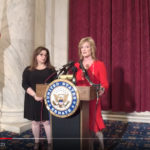Tyler Overman is an accountant for the Office of Sponsored Research at the University of North Carolina at Chapel Hill. Tyler works with departments on campus who’s research has been funded from a wide range of sources.
ENT 600-SME Interview: Chiffon Watkins, DOD Program Manager
I had the pleasure of interviewing Program Manager at the Department of Defense, Chiffon Watkins. I was, in particularly, interested in interviewing her because I intend to include a program manager in my personnel plan. I feel a program manager will play an intricate part in my startup. Ms. Watkins also gives some advice to businesses interested in contracting with the government. Watch this resourceful interview with Chiffon Watkins.
Interview with Informative Technologies CEO James Walker
I have known James for going on a year now, but never really took the time to get a complete understanding of his company, Informative Technologies. I originally met him at the UNC Charlotte campus where I was holding an electronic waste (commonly called “E-Waste”) collection and he came by to grab any computer components that had been dropped off. Intrigued by why he was doing this, I struck up a conversation with him where I learned that his company erases all the data on the computers, restores them to working order using spare parts and open source software, and then makes them available to low income families suffering with the digital divide (lack of access to the internet). With my company focusing on helping people identify sustainability causes they are passionate about (climate change, clean water, clean air, etc.) in their community and giving them weekly opportunity lists of how they can take action, the social good aspect of his company aligned well with mine and I was curious how he operates company with this focus driving it. The audio of this interview is just over 39:00, so in case you don’t have the time to listen to it all, these were some of my key takeaways:
- Using his network, he was able to identify school and state-sponsored programs that paid for his workers (workers came from these programs).
- The workers he brings in are mainly teenagers who have some flag in their past that makes other businesses hesitant of hiring them. He teaches them everything they need to know about building a computer and builds their professional skills they normally wouldn’t be exposed to. Plus, if they need a computer, the first one they build goes to them.
- His workers are also largely from the demographic households James is trying to impact, so the process of identifying areas to sell his computers (most are ~$100), his employees are extremely helpful.
- His main competition are non-profits. Even though Informative Technologies incorporates so much social good in its operations, people still are hesitant on why he is making money and think donating items is best.
- In his prior career, James made use of programs that were free or the company paid for in order to advance his knowledge. He didn’t know this existed until he had been at his job for years. With his employees, he introduces them to all of these similar opportunities right away.
Shelly Sun, Founder and CEO of BrightStar Healthcare, interview 9-26-18
- Shelly Sun, the CEO and Co-Founder of BrightStar Care, testifies before the House Ways and Means Committee at a hearing on the Tax-Related Provisions in the President’s Health Care Law in the Longworth House Office Building on Capitol Hill in Washington, D.C. on Tuesday, March 5, 2013. (Photo by Barbara L. Salisbury)
Shelly Sun founded BrightStar Healthcare in the early 2000’s due to an unfortunate situation with a family member. She felt that she could do better in a future company, and in about fourteen years she has built BrightStar Healthcare from nothing to over 20,000 employees nationwide and with annual current revenues of $435 million. She has testified before Congress and the Senate, she has been the chairman of the International Franchise Association, she has gone undercover on the TV show Undercover Boss, and she has visited with President Trump when he signed improved legislation for the Department of Labor as it relates to Joint Employer, an action meant to ensure that Franchisors are not the same as Franchisees and how they are treated by the IRS regarding employment labor. Please enjoy this 42 minute video/audio presentation.
Charles Michael Walton ENT600-50







